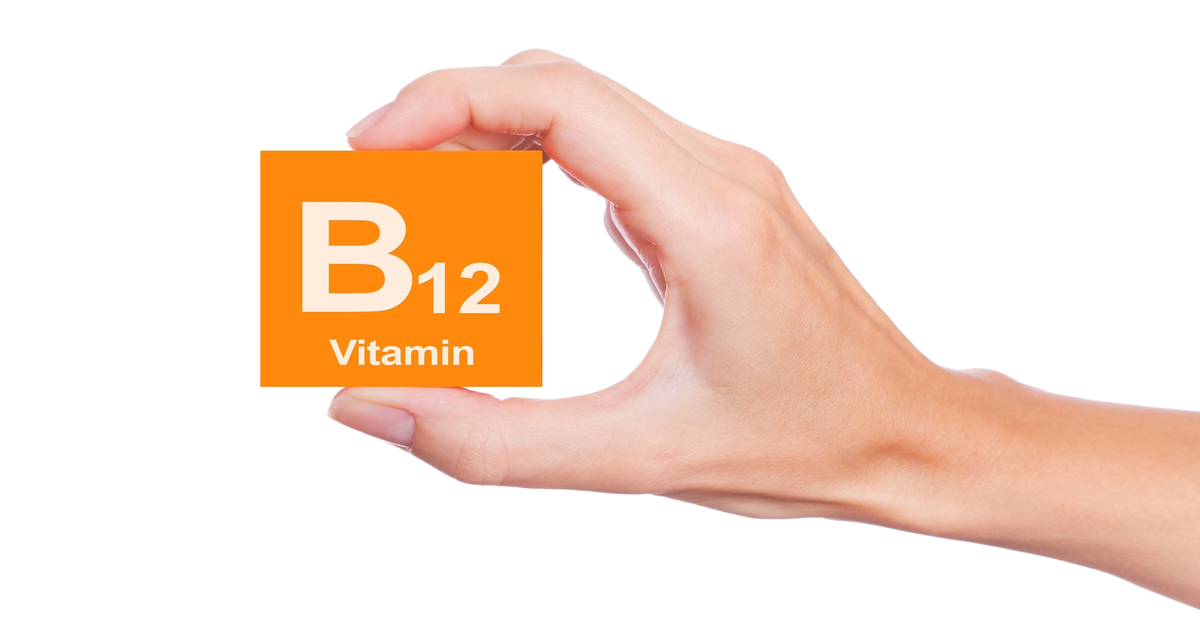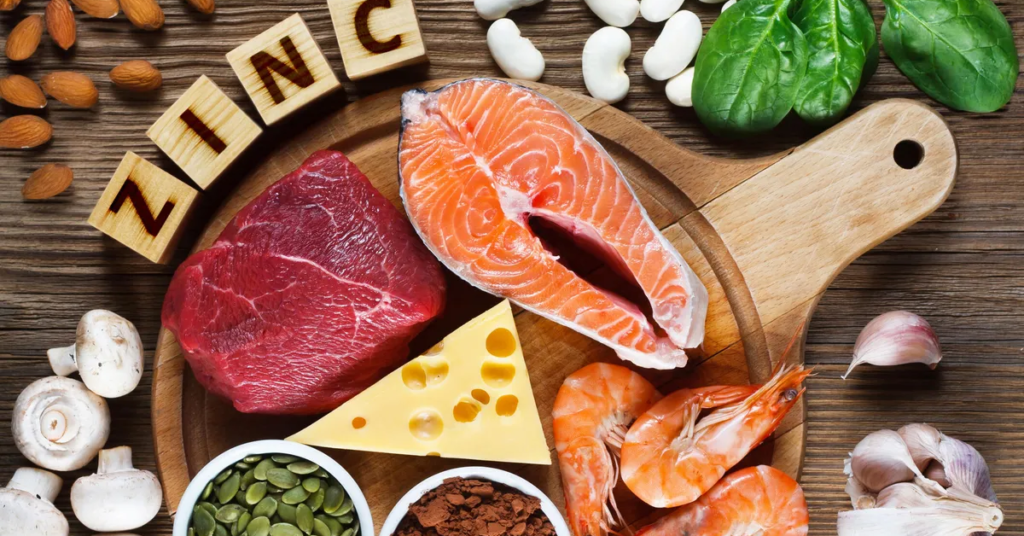VITAMIN B12
Vitamin B12, also known as cobalamin, is a crucial nutrient required for several biological processes in the body. It plays a significant role in maintaining a healthy nervous system, the production of red blood cells, and DNA synthesis. Recent studies have shown that vitamin B12 has a far more significant impact on our bodies than previously thought, particularly in relation to brain health, energy and fatigue, and stroke. We will explore the various benefits of vitamin B12 and discuss the mechanisms by which vitamin B12 influences the brain and the body. By the end of the article, you will have a comprehensive understanding of the benefits of vitamin B12 and why it is important to ensure adequate intake in your daily diet.
Structure
Vitamin B12, also known as cobalamin, is a vital vitamin and organometallic compound that contains cobalt within its molecular structure, allowing it to bind with metals. [1] This essential vitamin was first discovered in 1849 during a series of studies investigating a ‘factor’ in liver that could treat pernicious anemia. [1] Vitamin B12’s molecular structure was not fully understood until it was first structured in 1954-56. [1] This vitamin plays a significant role in both DNA synthesis and energy production as an enzyme cofactor.
Cobalamin is a versatile molecule that can bind to various substances, including cyanide (cyanocobalamin), a methyl group (methylcobalamin), deoxyadenosine (deoxyadenosylcobalamin), and a hydroxyl group (hydroxycobalamin). Among these forms, cyanocobalamin is found in trace amounts in food, and it is the most commonly supplemented form of B12. While methylcobalamin or 5-deoxyadenosylcobalamin are the only forms that can be enzymatic cofactors, the other forms can convert into them.
Cobalamin has a large molecular structure, referred to as an octahedral cobalt compound of the corrinoid series. The corrinoid structure of cobalamin resembles a porphyrin-like ring structure enclosing the cobalt ion. What distinguishes this structure from others in the series is the nucleotide side chain of B12, which ends with dimethylbenzimidazole.
Cobalamin is an organometallic compound that can form complexes with metal ions, which is evident from the presence of the cobalt ion in its structure.
Vitamin B12 serves as an enzymatic cofactor for several enzymes, such as:
- Methionine synthase required in purine and pyrimidine synthesis, leading to DNA synthesis. Methylcobalamin supports the enzyme by converting methyltetrahydrofolate into tetrahydrofolate (forms of folate) and subsequently homocysteine into methionine. This enzyme also reduces plasma homocysteine levels by using it as a substrate to form methionine.
- L-methyl-malonyl-CoA mutase, that uses 5-deoxyadenosylcobalamin as a cofactor to convert methylmalonyl CoA to succinyl CoA, which supports energy metabolism.
Vitamin B12 also plays a significant role in the process of methylation, which involves the donation of a small chemical group known as a methyl group from one molecule to another to support metabolic function. Several supplements are known to interact with this process, including B12, folate, S-adenosyl methionine, and betaine (a metabolite of choline). [1]
Main Takeaway: As a vital nutrient, Vitamin B12 comes in various forms and is water-soluble. It serves as an enzymatic cofactor, playing a crucial role in several physiological processes.
Vitamin B12 is crucial for the proper functioning of several enzymes in the body. Since these enzymes play a crucial role in metabolism, any disruption in their functioning can lead to disease states. This is why cobalamin is considered an essential vitamin.
In addition to supporting enzymes involved in DNA synthesis and energy metabolism, Vitamin B12 is also involved in methylation processes, which have far-reaching implications. However, it’s worth noting that vitamin B12 is not unique in this regard, as several other molecules can also act as or support methyl donation.
Sources
The major dietary source of vitamin B12 is animal-derived food, i.e., meat, milk, eggs, and fish, with beef, pork and chicken liver being the greatest sources of B12.
Deficiency
As people age, the levels of Vitamin B12 in their bodies tend to decline, and deficiencies become more prevalent. According to European data, the percentage of the population with suboptimal serum concentrations of Vitamin B12 (less than 200pg/mL or 148pM) increases from 23% in the 19-64-year age cohort to 62% above 65 years of age.
It’s important to note that the 62% prevalence rate of suboptimal serum concentrations of Vitamin B12 in people above 65 years of age is at the higher end of estimates. Depending on the source, the prevalence of Vitamin B12 deficiency in the older cohort can range from 5% to 60% in general. [1, 2, 3] In contrast, some studies have reported relatively lower deficiency rates of vitamin B12 in the elderly population, with one study showing a deficiency rate as low as 3.8% (1.9% in the whole population) based on serum B12 levels.
Insufficient intake of vitamin B12 can lead to macrocytic anemia, peripheral neuropathy, and cognitive impairment. However, not all individuals with a deficiency of B12 will experience these symptoms. Studies have shown that up to 40% of elderly individuals with B12 deficiency do not have anemia.
Conditions associated with a deficiency in vitamin B12 primarily stem from impairments in absorption and gastric digestion. These include surgical resection, autoimmune pernicious anaemia, chronic pancreatitis, [1] Celiac and Crohn’s disease, atrophic gastritis, achlorhydria, and the consequences of gastrectomy. These impairments can lead to a lessened ability to dissociate B12 that is bound to meat products or impaired uptake.
Apart from the issues with absorption, a deficiency of vitamin B12 is more common in vegetarian populations compared to omnivorous populations. This is because vitamin B12 is mainly found in animal products.
Blood serum concentrations are used to measure vitamin B12 levels, and while this method is consistent and trustworthy, it may not provide a precise representation of the body’s B12 reserves. A lack of correlation between plasma B12 concentrations and B12 deficiencies [1, 2] has been noted in some cases, resulting in a predictive accuracy as low as 22%.
A serum concentration of less than 200pmol/L combined with a homocysteine level above 20mM is considered a clinically significant deficiency.
Serum holotranscobalamin is a more accurate measure of vitamin B12 status than serum B12 concentrations, [1, 2, 3,] except in cases of kidney conditions. Another more accurate method is to measure either serum or urinary methylmalonic acid (MMA), [1] although this method is also affected by kidney conditions. [1]
While a dose of 500mcg can typically resolve B12 deficiencies for most individuals, some elderly people may require a higher dosage.
Vitamin B12 intramuscular injections have been used clinically for conditions with impaired absorption such as Crohn’s Disease with efficacy.
Main Takeaway: A deficiency in vitamin B12 can lead to macrocytic anemia and neural complications such as cognitive impairment and neuronal damage. The prevalence of deficiency is highly variable, with elderly individuals, vegetarians, and those with digestive or intestinal complications being at higher risk.
Vitamin B12 levels can be determined through various methods, including blood measurements (which are reliable but not always accurate), measuring serum holotranscobalamin (which is more accurate in most cases except for kidney conditions), and measuring either serum or urinary methylmalonic acid (MMA), which is more accurate but can be affected by kidney conditions.
While a dose of 500mcg can typically resolve B12 deficiencies for most individuals, some elderly people may require a higher dosage.
Pharmacology
Transcobalamin is a carrier protein for vitamin B12 in the blood. About 80% of vitamin B12 is transported in an inactive form called haptocorrin, while the remaining 20% is carried in the active form called transcobalamin II. [1] When transcobalamin II is bound to vitamin B12, it is referred to as holotranscobalamin (holoTC) and actively delivers B12 to cells.
A factor contributing to the unreliability of serum B12 as a biomarker is the partial deficiency of haptocorrin, which can lead to a decrease in total serum B12. A deficiency in haptocorrin does not have as significant an impact on bodily function as a deficiency in holoTC, as haptocorrin does not actively transport B12 into tissue. This is why holoTC is another biomarker used to assess B12 status.
Intrinsic factor (IF) is another carrier protein responsible for transporting cobalamin across the intestinal wall. When cobalamin binds to haptocorrin in the stomach, it is released upon degradation by pancreatic proteases and then binds to IF. IF then transports cobalamin via its transporters and is subsequently degraded, releasing cobalamin to be taken up by transcobalamin II. [1]
As B12 is a relatively large molecule, it requires transporters to be taken up into cells rather than relying on passive diffusion.
Main Takeaway: Vitamin B12 is transported in the bloodstream by both active transporters, such as transcobalamin II, and inactive transporters, such as haptocorrin. Changes in haptocorrin levels may cause serum B12 levels to fluctuate without affecting vitamin B12 status, as haptocorrin does not actively deliver B12 to cells. On the other hand, changes in active transporters such as transcobalamin II can affect vitamin B12 status.
The carrier protein known as intrinsic factor (IF) serves as a mediator of intestinal absorption of B12.
Depression
According to research, individuals with depression have lower levels of both B12 and folate compared to non-depressed individuals, with a prevalence ranging from 17-31% for B12 and 15-38% for folate. [1, 2, 3] These decreased levels of vitamins are noted to occur prior to an increase in plasma homocysteine concentrations.
An interesting association has been found between B12 and melancholic depressive symptoms but not with non-melancholic symptoms, while folate is also linked to depression but to a lesser extent.
B12 itself plays a causative role, as according to a study, B12 serum concentrations (17% prevalence in mild depression and 27% in severe depression) were found to be predictive of depression, even though folate and homocysteine levels were normal. Another study noting correlations with all three factors and depression noted that B12 had the strongest association.
A study that administered antidepressant therapy found that serum B12 levels at baseline were predictive of a positive treatment outcome.
Main Takeaway: Although not all depressed individuals are affected, studies have shown that depressed individuals are more likely to have lower levels of B12 and folate than nondepressed individuals. Both homocysteine and folate are involved in this association, as well as methylation processes in general. However, B12 itself is believed to be involved independently.
Stroke
People with lacunar stroke who suffer from depression and fatigue symptoms may be at a higher risk for B12 deficiency.
In a small pilot study conducted on 14 individuals who had experienced their first lacunar strokes, it was found that 3 months of treatment with 1,000mcg of hydroxycobalamin improved verbal learning in a subset of participants (6/14). However, there was no significant improvement in fatigue or depressive symptoms.
Cardiovascular Health
Homocysteine is a small molecule that is used by the vitamin B12-dependent enzyme, to create methionine. [1] When B12 concentrations are lower than optimal (and this enzyme subactive) concentrations of homocysteine are elevated.
Studies have shown that supplementation with 100-500mcg of vitamin B12 can effectively reduce homocysteine levels. However, doses of 10mcg or less have been found to be ineffective, despite many studies using B-complex formulations that include less than 10mcg of B12. [1]
Inflammation & Immunology
Research has suggested that the liver stores a significant amount of vitamin B12 and that decreased levels of B12 may be present in individuals with liver conditions, [1] which may avoid diagnosis since liver concentrations are unrelated to serum concentrations. This fact, paired with the role vitamin B12 plays in replication of the hepatitis C virus, as it inhibits IRES-dependent translation without affecting the cap-dependent mechansims in a concentration-dependent manner suggests a protective property of supplementation.
In patients with hepatitis C, supplementation of B12 was associated with a significantly higher rate of early (21%) and sustained (34%) virologic response.
Main Takeaway: B12 in high doses has been found to have potential benefits for those with hepatitis C, as it may inhibit the replication of the virus in a dose-dependent manner. However, this effect seems to be specific to hepatitis C and may not affect other viral infections.
Interactions with Pregnancy & Infants
Higher dietary intakes of B12 in pregnant mothers during the last six months of pregnancy appear to be associated with a lower risk for acute lymphoblastic leukemia in their children, and suggested a slightly greater protective effect in women who consumed alcohol.
Lack of vitamin B12 in the maternal diet during pregnancy has been shown to cause severe retardation of myelination in the nervous system. Insufficient maternal intake of vitamin B12 is also associated megaloblastic anemia.
Infants of mothers on such a diet result in:
Main Takeaway: Lack of vitamin B12 in the maternal diet during pregnancy has been shown to cause severe retardation of myelination in the nervous system, megaloblastic anemia, serious hematological, metabolic and neurological complications, extreme developmental regression, hypotonia and cerebral atrophy, poor weight gain, feeding difficulties, severe pallor, muscle hypotonia and somnolence. A pregnant mother should under no circumstances follow a vegan diet, nor in the years prior to the pregnancy, as they result in nutritional deficiency of vitamin B12.
Nutrient Interactions
Folate, also known as folic acid, is a B-vitamin that is often taken together with B12 supplements. However, high intake of folate can mask symptoms of anemia caused by B12 deficiency while possibly worsening macrocytic anemia. Additionally, taking folate supplements does not reduce the risk of cognitive impairment caused by B12 deficiency. In cases where folate supplementation is needed to reduce the risk of undiagnosed B12 deficiency, B12 is also supplemented.
Main Takeaway: Supplementing with folic acid can mask the diagnosis of a vitamin B12 deficiency, which is why B12 is often supplemented along with folate. This is not because the two vitamins work well together, but rather because adding B12 to folate supplementation reduces the risk of an undiagnosed B12 deficiency.
Safety & Toxicology
Elevated serum concentrations of B12 (Hypercobalaminemia, defined as 950pg/mL or 709pmol/L) can be a side-effect of some serious conditions, such as chronic myelogeneous leukemia, promyelocytic leukemia, polycythemia vera and also the hypereosinophilic syndrome which is primarly due to excessive production of haptocorrin. B12 is not considered to be causative of the damage associated with these conditions, it rather serves as a biomarker for them.
Summary
As a vital nutrient, Vitamin B12 comes in various forms and is water-soluble. It serves as an enzymatic cofactor, playing a crucial role in several physiological processes.
As a vital nutrient, Vitamin B12 comes in various forms and is water-soluble. It serves as an enzymatic cofactor, playing a crucial role in several physiological processes.
Vitamin B12 is crucial for the proper functioning of several enzymes in the body. Since these enzymes play a crucial role in metabolism, any disruption in their functioning can lead to disease states. This is why cobalamin is considered an essential vitamin.
In addition to supporting enzymes involved in DNA synthesis and energy metabolism, Vitamin B12 is also involved in methylation processes, which have far-reaching implications. However, it’s worth noting that vitamin B12 is not unique in this regard, as several other molecules can also act as or support methyl donation.
The major dietary source of vitamin B12 is animal-derived food, i.e., meat, milk, eggs, and fish, with **beef, pork and chicken liver** being the greatest sources of B12.
A deficiency in vitamin B12 can lead to macrocytic anemia and neural complications such as cognitive impairment and neuronal damage. The prevalence of deficiency is highly variable, with elderly individuals, vegetarians, and those with digestive or intestinal complications being at higher risk.
Vitamin B12 levels can be determined through various methods, including blood measurements (which are reliable but not always accurate), measuring serum holotranscobalamin (which is more accurate in most cases except for kidney conditions), and measuring either serum or urinary methylmalonic acid (MMA), which is more accurate but can be affected by kidney conditions.
While a dose of 500mcg can typically resolve B12 deficiencies for most individuals, some elderly people may require a higher dosage.
Vitamin B12 is transported in the bloodstream by both active transporters, such as transcobalamin II, and inactive transporters, such as haptocorrin. Changes in haptocorrin levels may cause serum B12 levels to fluctuate without affecting vitamin B12 status, as haptocorrin does not actively deliver B12 to cells. On the other hand, changes in active transporters such as transcobalamin II can affect vitamin B12 status.
The carrier protein known as intrinsic factor (IF) serves as a mediator of intestinal absorption of B12.
Although not all depressed individuals are affected, studies have shown that depressed individuals are more likely to have lower levels of B12 and folate than nondepressed individuals. Both homocysteine and folate are involved in this association, as well as methylation processes in general. However, B12 itself is believed to be involved independently.
B12 in high doses has been found to have potential benefits for those with hepatitis C, as it may inhibit the replication of the virus in a dose-dependent manner. However, this effect seems to be specific to hepatitis C and may not affect other viral infections.
Lack of vitamin B12 in the maternal diet during pregnancy has been shown to cause:
- severe retardation of myelination in the nervous system,
- megaloblastic anemia,
- serious hematological, metabolic and neurological complications,
- extreme developmental regression,
- hypotonia and cerebral atrophy,
- poor weight gain,
- feeding difficulties,
- severe pallor,
- muscle hypotonia and
- somnolence.
A pregnant mother should under no circumstances follow a vegan diet, nor in the years prior to the pregnancy, as they result in nutritional deficiency of vitamin B12.
Supplementing with folic acid can mask the diagnosis of a vitamin B12 deficiency, which is why B12 is often supplemented along with folate. This is not because the two vitamins work well together, but rather because adding B12 to folate supplementation reduces the risk of an undiagnosed B12 deficiency.







